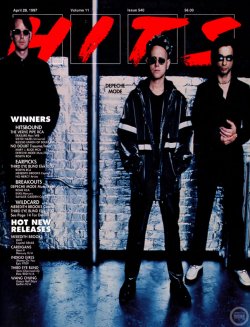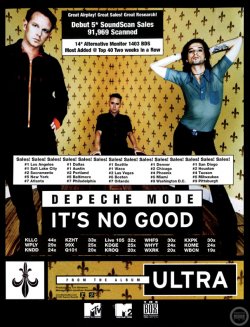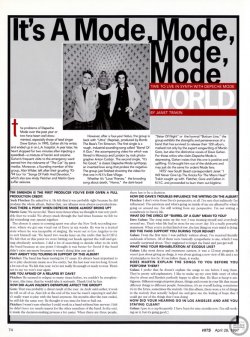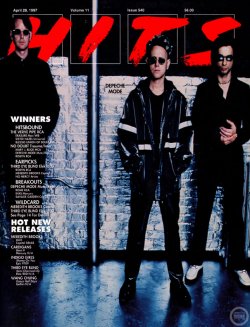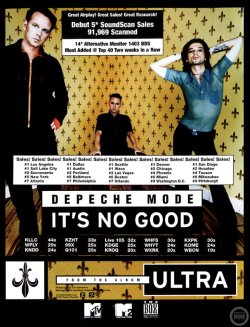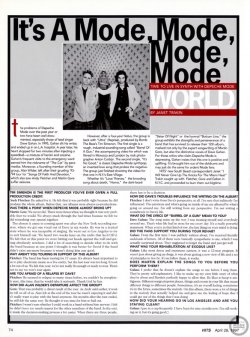You are using an out of date browser. It may not display this or other websites correctly.
You should upgrade or use an alternative browser.
You should upgrade or use an alternative browser.
Depeche Mode It's A Mode Mode Mode Mode World! (Hits, 1997)
- Thread starter demoderus
- Start date
Short article combining a quick resume, a review of Ultra and a mini-interview of the band. The writing is somewhat flat and interview covers the usual ground, so there is comparatively little here that will be new to many people, although this is another good starting point if you're new to Depeche Mode.
" "On this album, there were a lot of things in the melody that actually helped me and gave me the feeling of hope I could get out of the things that I was doing.""
The problems of Depeche Mode over the past year or two have been well-documented, especially those of lead singer Dave Gahan. In 1995, Gahan slit his wrists and ended up in an L.A. hospital. A year later, his heart stopped for two minutes after injecting a speedball - a mixture of heroin and cocaine. Gahan's frequent visits to the emergency ward earned him the nickname of 'The Cat' by paramedics. Moreover, a founding member of the group, Alan Wilder, left after their grueling '93-'94 tour for 'Songs Of Faith And Devotion', which also saw Andy Fletcher and Martin Gore suffer seizures.
However, after a four year hiatus, the group is back with 'Ultra' (Reprise), produced by Bomb The Bass's Tim Simenon. The first single is a rough, industrial-sounding song called 'Barrel Of A Gun', the accompanying video for which was filmed in Morocco by rock photographer Anton Corbijn. The second single, 'It's No Good', is classic Depeche Mode synthpop, an inverted love song that probes the negative. The group just finished shooting the video for that one in N.Y.'s East Village.
Whether it's 'Love Thieves', the brooding song about death, 'Home', the dark-laced 'Sister Of Night' or the hymnal 'Bottom Line', the group exhibits the strengths and perseverance of a band that has survived to release their 12th album, marked not only by the expert songwriting of Martin Gore, but also the distinctive vocals of Dave Gahan. For those critics who claim Depeche Mode is depressing, Gahan insists that this one is positive and uplifting. It's brought him out of the doldrums and may just do the same for ardent Mode fans.
HITS' new South Beach correspondent Janet 'I Will Never Give Up The Knicks For The Miami Heat' Trakin caught up with Fletcher, Gore and Gahan in N.Y.C. and proceeded to burn them out bigtime.
Tim Simenon is the first producer you've ever given a full production credit.
Andy Fletcher: He asked for it. He felt that it was probably right because he did produce the whole album. Before that, our albums were always co-productions.
Was there a point when Depeche Mode almost broke up?
Martin Gore: We never did. There were times when we thought it was very probable that we would. We always stuck through the bad times because we felt we did something very special together.
The closest it came to coming apart was after the New York recording session, where we got one vocal out of Dave in six weeks. He was in a typical state where he was incapable of singing. He went out to Los Angeles to try to sort himself out. We heard two weeks later on the radio that he'd OD'd. We felt that at this point we were hitting our heads against the wall and getting absolutely nowhere. I did a lot of searching to decide what to do with the band because at one point I thought it was better for David if the band didn't exist anymore because it wasn't doing him any good.
Why aren't you touring in support of this album?
Fletcher: The band has been touring for 17 years. It's always been important for us to play electronic music as a live entity, but the last tour was too long. It took a lot out of us. We felt this year, we're not really fit enough or ready to tour. [1] That's not to say we won't tour again.
Are you afraid of a relapse by Dave?
Fletcher: He seemed to relapse so many times before, we couldn't be completely sure, this time, that he would take it seriously. Thank God he has.
How did Alan Wilder's departure affect the group?
Gore: That was probably a direct result of the tour. As Andy said earlier, It took its toll on all of us. Alan felt at the end of the tour he wasn't enjoying it and didn't really want to play with the band anymore. Six months after the tour ended, he still felt the same way. He thought it was to for him to bail out.
Fletcher: I wasn't sure whether I could work in a band without him anyway. I felt he didn't have too much respect for the other members of the band. In the end, it made the decision-making process a lot easier. When there are three people, there has to be a decision.
How did Dave's troubles influence the writing on the album?
Gore: I don't write from Dave's perspective at all. I'm sure that indirectly I'm influenced. The emotion and what's going on inside of me are affected by what's going on around me. I'm still writing from my perspective. I'm not writing a soundtrack to Dave's life.
What do the lyrics of 'Barrel Of A Gun' mean to you?
Dave Gahan: The song sums up the way I was treating myself and everybody around me. That's what life had in store for me every day. It's a really powerful statement. When you're in that kind of row, the last thing on your mind is dying.
Did the fans support you during your rehab?
Gahan: From the first time I was publicly written about, I've received literally sackloads of letters. All of them were basically sympathetic to me, which I was actually surprised about. They suggested to forget the band and just get well.
What was your rehabilitation at Exodus like?
Gahan: Like most detox and treatment centers, it was a 12-step program. It wasn't just about giving up drugs, it was about getting a new view of life and a set of principles to live by. If you follow them, it works.
Does Martin explain the songs to you before you perform them?
Gahan: I prefer that he doesn't explain the songs to me before I sing them. They're pretty self-explanatory. I like to make up my own little story of what they're about and Martin's perfectly happy to allow that. He likes to keep it ambiguous. Different songs pinpoint places, things and events in your life that mean different things to different people. Sometimes, it's an overall feeling, sometimes it's in the lyrics, sometimes in the melody. On this album, there were a lot of things in the melody that actually helped me and gave me the feeling of hope I could get out of the things that I was doing.
How did your hearing go in Los Angeles and are you staying clean?
Gahan: I pee in a cup frequently. I have been for nine months now. I'm still working on it, but it's going good.
[1] - The reasons given for not touring are perfectly good ones in themselves, but also there was probably the matter of Gahan still being on bail and needing to take a drugs test twice every week until summer 1998.

